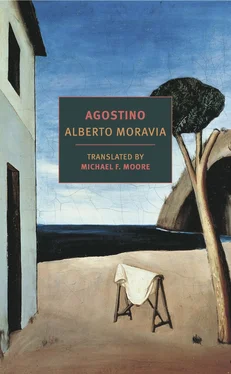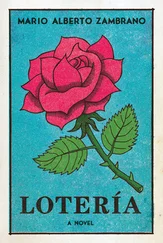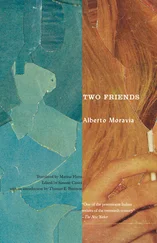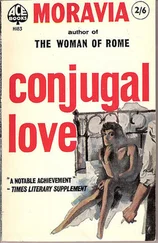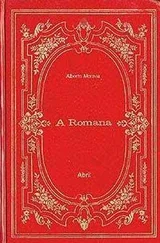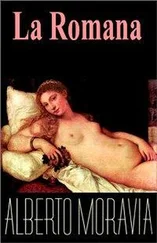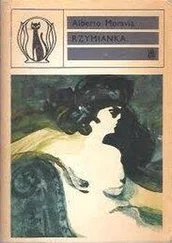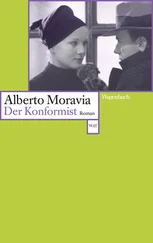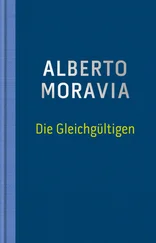He waited a long while. At a certain point he started to feel drowsy and he really did nod off. All at once he woke with a start. The lamp was on, illuminating the mother’s back. She was wearing a negligee and had one knee on the bed, getting ready to turn in for the night. “Mamma,” he said immediately in a loud and almost violent voice.
The mother turned around and came near him. “What’s wrong?” she asked. “Is something the matter, dear?” Her negligee was transparent, like the gown of the woman at the house. Her body was also shaped like the other body, in vague lines and shadows. “I want to leave tomorrow,” said Agostino, in the same loud and exasperated voice, trying not to look at the mother’s body but at her face.
The mother, startled, sat down on the bed and stared at him. “Why? What’s the matter? Aren’t you having a good time here?”
“I want to leave tomorrow,” he repeated.
“We’ll see,” said the mother, discreetly passing a hand over his forehead, as if she was afraid he had a fever. “What’s the matter? Don’t you feel well? Why do you want to leave?”
Agostino said nothing. The mother’s negligee reminded him of the gown worn by the woman at the house, the same transparency, the same pale flesh, listless and within reach. Except the negligee was wrinkled, making it even more intimate and his glimpse of her even more furtive. So, Agostino thought, not only did the image of the woman at the house not act as a screen between himself and the mother, as he had hoped, but it had somehow confirmed the mother’s womanhood. “Why do you want to leave?” she asked again. “Don’t you enjoy spending time with me?”
“You always treat me like a baby,” Agostino said all at once, not even he knew why.
The mother laughed and patted him on the cheek. “All right, then, from now on I’ll treat you like a man. Will that make you happy? Now go to sleep… it’s late.” She bent down and kissed him. With the light out, Agostino could hear her getting into bed.
“Like a man,” he couldn’t help but think to himself before falling asleep. But he wasn’t a man, and many unhappy days would pass before he became one.
IN THE book-length interview he granted to his friend, the writer Alain Elkann, Alberto Moravia described Agostino as “the hinge that connects Gli indifferenti with my later works.” Written in one month in 1942 on the island of Capri, the novel marked a return to form both in his own and in critical estimation. He felt that it recaptured the “spontaneous, necessary quality” that had characterized his debut novel, Gli indifferenti (translated as The Time of Indifference) , whose success had initially proved difficult to repeat. Published in 1929 when Moravia was twenty-one years old, the novel was reprinted four times before it came out in a second edition in 1934. By contrast his next long novel, Le ambizioni sbagliate (The Mistaken Ambitions , 1935), on which he had labored for seven years, was a disappointment, aggravated by the censorship of the Fascist regime, which instructed the newspapers not to review the novel and confiscated his next, La mascherata (The Fancy Dress Party , 1941).
Agostino was first published by a smaller house, Documento, in 1943 and then brought out in a revised edition the next year by Bompiani. In 1945 it was awarded Italy’s first postwar literary prize, the Corriere Lombardo. It is indeed a “hinge” or transitional work, certainly in terms of his career: the publication of La romana (The Woman of Rome) two years later would establish his international reputation, and his works began to appear in translation. The themes of Agostino indicate a broadening of the author’s focus — although his gaze remains resolutely centered on the bourgeoisie — and a deeper engagement with the themes of poverty and social injustice. In his conversations with Elkann, Moravia described the work as “the story of a childhood vacation, but… also the story of Agostino’s encounter with modern culture, and its premise is the work of two great unmaskers, Marx and Freud.” While his interest in Freudian psychology was already apparent in Gli indifferenti , his exploration of class conflict heralds a new era in his writing as part of the general movement in Italian culture known as neorealism. Moravia collaborated closely with the most important postwar film directors, and many of his works, most prominently La ciociara (translated into English as Two Women) , were adapted for the big screen.
But it is the stylistic transition in Agostino that most interests me as a translator. Although he tired of the attention it garnered, Moravia’s prose stood out from the beginning as spare and brutal, especially by comparison to the high literary manner that prevailed in Italy during the early years of the century. His champions and critics alike pointed to what they considered his unadorned style. In one of the first reviews of Gli indifferenti , the novelist Giuseppe Antonio Borgese praised Moravia as having “a very beautiful art of writing because it is cleansed of frills, the exact opposite of the vexing lack of originality, the false and toxic ’beautiful writing,’ that had reduced prose to tattoos with acid.” These same features were dismissed by more traditional critics, most famously the great philologist Gianfranco Contini, who called Moravia’s prose “a gray and neutral koine of the capital city, the zero-degree language of a Pirandello stripped of gesture.”
Contini and others acted as gatekeepers of a literary tradition rooted in the courtly love poetry of thirteenth- and fourteenth-century Tuscany. Its strictures were such, in the most extreme instances of the Renaissance, that not a single word could be used that was not found in Petrarch or Boccaccio. In as linguistically fragmented a country as Italy, with its many regional and even local dialects, writing in “pure” standard Italian was a daunting challenge for writers from outside the Florence-Rome matrix. For the modern novelist, starting with Manzoni, the challenge was to transform an essentially lyric medium into a flexible, contemporary prose adapted to the needs of narrative realism.
In a recent book-length study of Moravia’s style, Gianluca Lauta documents the more conventional aspect of his prose as well as its distinctiveness. He argues that the often criticized blandness of Moravia’s dialogues is shaped by the intellectual emptiness of his bourgeois characters: “On the one hand, Gli indifferenti participates in the collapse of the grand classical style, on the other, it comes close to the superficial dialogues, typical of salons, that had been used in lowbrow novels for at least two centuries.” Comparing the edits that Moravia made from the first to the second editions of Agostino , Lauta notes his “clear intention to use the most appropriate word, even to the detriment of perfectly acceptable forms.”
The idea that Moravia was engaged in “invisible writing” or tearing down the edifice of classical Italian is not entirely borne out by a close analysis of Agostino. I would say instead that he is turning the literary tradition on its head, adopting the conventions of courtly love poetry but for more earthly ends. Like many a forlorn poet, the narrator suffers the afflictions of unrequited love, but the object of his affection, scandalously, is his mother. Rather than seek to elevate her, like Petrarch’s Laura, he is intent on debasing her, repeating, like a mantra, “She’s only a woman.” In his eyes her body takes on distorted proportions, and exudes, after her indiscretions with the young boatman, an “acrid, violent animal warmth.”
Читать дальше
